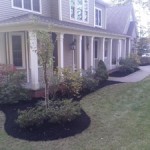 Are you tired of the dust bowl kicked up time after time by your lawnmower blades as your lawn meets the woodline? Mulching where the grass edge ends makes for a well-manicured and dustless mowing. Bark mulch is one easy way to make your residential or commercial property look fantastic in warm weather. Rich colors and uniform texture are two of the factors that contribute to the visual appeal of bark mulch.
Are you tired of the dust bowl kicked up time after time by your lawnmower blades as your lawn meets the woodline? Mulching where the grass edge ends makes for a well-manicured and dustless mowing. Bark mulch is one easy way to make your residential or commercial property look fantastic in warm weather. Rich colors and uniform texture are two of the factors that contribute to the visual appeal of bark mulch.
Defines areas. Have you ever planted a garden only to watch it get trampled or mowed down? Using bark mulch can prevent you from experiencing such a traumatic event. People are more likely to walk through patches of bare dirt or grass than they are to tread all over your garden, so use bark mulch to create a distinct visual difference between lawn areas and garden areas.
Prevents weeds. Weeds can be unsightly and choke out the plants you actually intend to grow. After you plant your garden, add bark mulch to cover the ground layer, but allow your plants to stick out through the surface. This will prevent sun from reaching weed seeds and sprouts that are lower, and without sun, the weeds are less likely to thrive.
Retains moisture. Bark mulch is naturally absorbent and will prevent your plants from wilting as much during summer heat waves and hot days. You don’t have to let your plants wilt and dry out.
Moderates temperature. On cold days, your garden needs to stay warm, and on hot days, it needs to stay cool. The temperature of the plant roots matters as much as the part of the plant that is above ground. Bark mulch can also help prevent frost heaves, which is a natural phenomenon in cold weather that literally pushes plants out of the ground as the soil contracts and expands with temperature changes.
Adds nutrients. Bark mulch is made entirely of organic materials, which will break down over time and decompose. It’s a good idea to replace the nutrients in garden soil every now and then, as the plants obviously deplete the soil’s nutrients over time.







